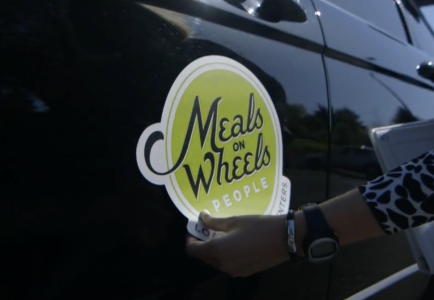Seniors are worried: Is DOGE putting Meals on Wheels at risk?
By
Veronica E.
- Replies 6
For many older Americans, Meals on Wheels is more than just a delivery—it’s a sense of security, comfort, and a reminder that they’re not alone.
But now, whispers of budget cuts and federal restructuring have created a wave of uncertainty around this lifeline service.
Could these changes mean fewer meals—and fewer check-ins—for the people who need them most?
“With all these cuts going on everywhere, I am very concerned. It’s a very stressful situation,” shares 89-year-old Rose Marie Delagram of Whiting, New Jersey.
She’s not alone in her worry.
Across the country, the dedicated staff and volunteers behind Meals on Wheels are bracing for what’s next.

Much of the concern stems from a major restructuring within the federal Administration for Community Living—an agency under the US Department of Health and Human Services.
As part of a shakeup announced March 27 by the newly formed Department of Government Efficiency (DOGE), roughly 40% of staff were let go, including the entire team overseeing key funding grants.
That includes the Social Services Block Grants program, which helps close financial gaps when local funding falls short.
Now, it's unclear how—or if—those funds will be administered moving forward.
While the primary source of federal support for Meals on Wheels comes from the Older Americans Act, any disruption in supplemental funding could spell trouble for many local programs.
Josh Protas, chief advocacy and policy officer at Meals on Wheels America, says there’s still a lot of uncertainty: “There are a lot of question marks right now.”
Even without immediate disruptions, the long-term impact could be significant.
Nearly one-third of local programs already report being unable to meet all the demand in their areas. “We know the difference we can make in people’s lives and in their communities,” Protas explains. “We just need adequate levels of funding and support to do that even more effectively.”
Also read: Breaking: Trump administration reverses spending freeze—what you need to know
In places like Ocean County, New Jersey, that difference is felt every day—not only through meal deliveries but also through group activities like crafts and chair exercises.
Heather DeJong, community relations specialist for Meals on Wheels of Ocean County, says a loss of federal support could mean 300 fewer seniors receiving meals and services.
“Seniors are already asking their drivers, ‘Am I going to get a meal tomorrow?’” she shares.
Also read: Breaking: DOGE plans to eliminate 69 programs in latest budget cuts
The value of Meals on Wheels goes far beyond nutrition.
For many seniors, the program also provides regular wellness checks, helps identify signs of cognitive decline, and ensures that someone is looking out for them.
It helps keep seniors in their homes—and out of more costly care facilities.
While Meals on Wheels America has not experienced layoffs itself, it continues to advocate for its local partners.
“We recognize the anxiety they have,” says Protas. “And we’ll continue with our best reassurances that we’re fighting for them.”
Also read: The White House reveals Elon Musk's surprising real authority over DOGE–Here's what you need to know.
Local organizers like DeJong are ready to speak out, penning letters to lawmakers and reminding them what’s at stake.
“Look under the hood before you make funding decisions,” she urges.
Many seniors—especially those without family nearby—depend on Meals on Wheels for nourishment, connection, and peace of mind.
As Delagram puts it, “If it’s taken away, I don’t know what seniors will do… It would be a complete disaster.”
As the future of Meals on Wheels hangs in the balance, one thing is clear—these meals mean far more than food.
They represent care, connection, and dignity for countless seniors. Now more than ever, it’s time to speak up, stay informed, and stand together to protect the services our older loved ones depend on.
Read next: A major shake-up at Social Security—what it means for your personal data

At The GrayVine, we believe every senior deserves to feel seen, supported, and cared for. Have you or someone you love been touched by Meals on Wheels? Share your story in the comments—let’s keep this conversation going and show our support for the programs that truly make a difference.
But now, whispers of budget cuts and federal restructuring have created a wave of uncertainty around this lifeline service.
Could these changes mean fewer meals—and fewer check-ins—for the people who need them most?
“With all these cuts going on everywhere, I am very concerned. It’s a very stressful situation,” shares 89-year-old Rose Marie Delagram of Whiting, New Jersey.
She’s not alone in her worry.
Across the country, the dedicated staff and volunteers behind Meals on Wheels are bracing for what’s next.

A Meals on Wheels volunteer delivers more than just food—offering connection, care, and peace of mind to seniors across the country. Image Source: YouTube / Meals on Wheels People.
Much of the concern stems from a major restructuring within the federal Administration for Community Living—an agency under the US Department of Health and Human Services.
As part of a shakeup announced March 27 by the newly formed Department of Government Efficiency (DOGE), roughly 40% of staff were let go, including the entire team overseeing key funding grants.
That includes the Social Services Block Grants program, which helps close financial gaps when local funding falls short.
Now, it's unclear how—or if—those funds will be administered moving forward.
While the primary source of federal support for Meals on Wheels comes from the Older Americans Act, any disruption in supplemental funding could spell trouble for many local programs.
Josh Protas, chief advocacy and policy officer at Meals on Wheels America, says there’s still a lot of uncertainty: “There are a lot of question marks right now.”
Even without immediate disruptions, the long-term impact could be significant.
Nearly one-third of local programs already report being unable to meet all the demand in their areas. “We know the difference we can make in people’s lives and in their communities,” Protas explains. “We just need adequate levels of funding and support to do that even more effectively.”
Also read: Breaking: Trump administration reverses spending freeze—what you need to know
In places like Ocean County, New Jersey, that difference is felt every day—not only through meal deliveries but also through group activities like crafts and chair exercises.
Heather DeJong, community relations specialist for Meals on Wheels of Ocean County, says a loss of federal support could mean 300 fewer seniors receiving meals and services.
“Seniors are already asking their drivers, ‘Am I going to get a meal tomorrow?’” she shares.
Also read: Breaking: DOGE plans to eliminate 69 programs in latest budget cuts
The value of Meals on Wheels goes far beyond nutrition.
For many seniors, the program also provides regular wellness checks, helps identify signs of cognitive decline, and ensures that someone is looking out for them.
It helps keep seniors in their homes—and out of more costly care facilities.
While Meals on Wheels America has not experienced layoffs itself, it continues to advocate for its local partners.
“We recognize the anxiety they have,” says Protas. “And we’ll continue with our best reassurances that we’re fighting for them.”
Also read: The White House reveals Elon Musk's surprising real authority over DOGE–Here's what you need to know.
Local organizers like DeJong are ready to speak out, penning letters to lawmakers and reminding them what’s at stake.
“Look under the hood before you make funding decisions,” she urges.
Many seniors—especially those without family nearby—depend on Meals on Wheels for nourishment, connection, and peace of mind.
As Delagram puts it, “If it’s taken away, I don’t know what seniors will do… It would be a complete disaster.”
As the future of Meals on Wheels hangs in the balance, one thing is clear—these meals mean far more than food.
They represent care, connection, and dignity for countless seniors. Now more than ever, it’s time to speak up, stay informed, and stand together to protect the services our older loved ones depend on.
Read next: A major shake-up at Social Security—what it means for your personal data
Key Takeaways
- Seniors and workers connected to Meals on Wheels programs are concerned about potential impacts from federal layoffs and spending cuts.
- The uncertainty stems from layoffs affecting 40% of the staff at the Administration for Community Living, which supports older adults and home-delivered meal programs.
- Meals on Wheels America supports local programs through funding, education, and advocacy, highlighting the effectiveness of these services over the past 50 years.
- The potential cuts to federal funding are alarming to program providers and recipients, as Meals on Wheels also provides critical daily wellness checks for seniors.
At The GrayVine, we believe every senior deserves to feel seen, supported, and cared for. Have you or someone you love been touched by Meals on Wheels? Share your story in the comments—let’s keep this conversation going and show our support for the programs that truly make a difference.






